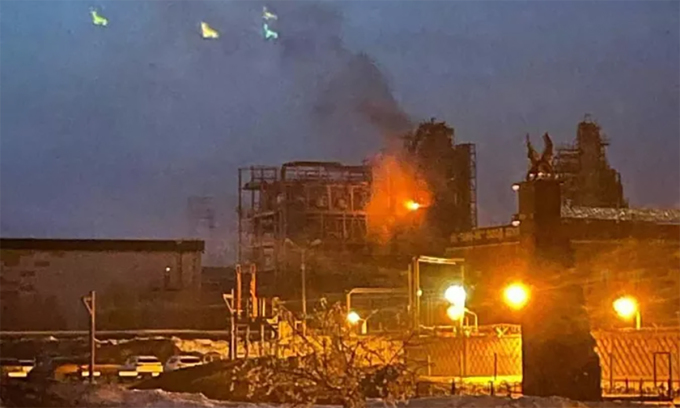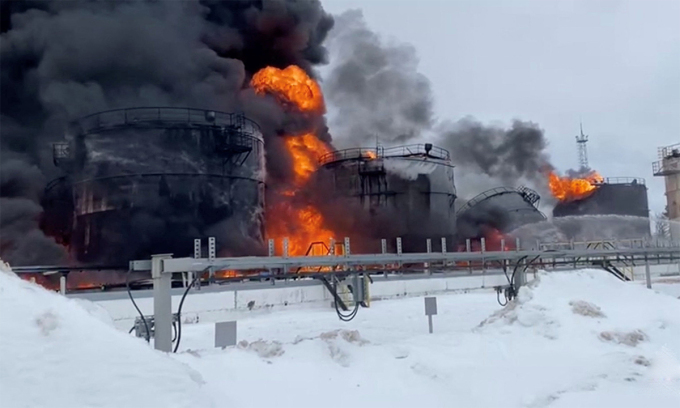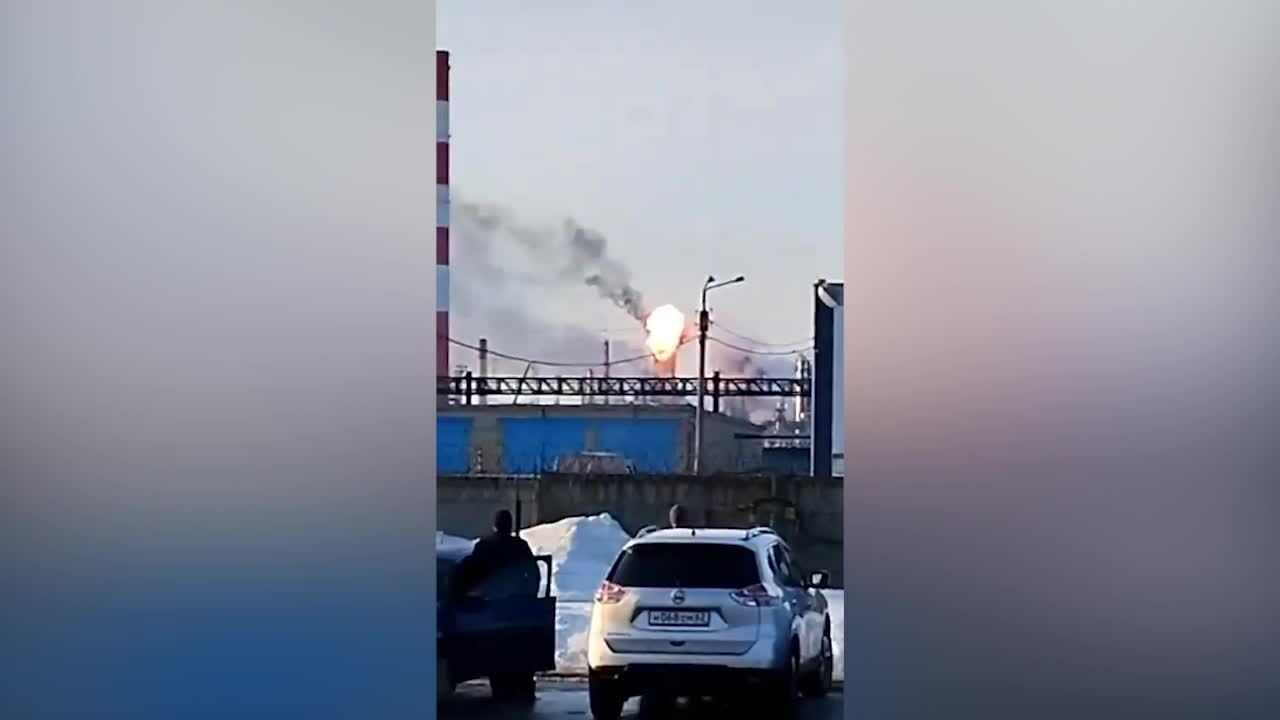The US sees the raids on Russian oil refineries as reckless and risking raising energy prices, while Ukraine says they are necessary.
During a February meeting on the sidelines of the Munich Security Conference, US Vice President Kamala Harris told President Volodymyr Zelensky what he did not want to hear: that Ukraine should refrain from attacking oil refineries on Russian territory. US officials said the move would raise global energy prices and prompt Russia to retaliate more harshly against Ukraine.
According to unnamed US officials, Ms Harris’s proposal upset Mr Zelensky and his senior aides, who said drone strikes on Russian energy infrastructure were a rare bright spot in a fierce conflict in which Ukraine faced an enemy with overwhelming numbers and firepower.
Mr. Zelensky did not heed Ms. Harris’s advice because he was not sure whether it reflected the consensus view of the Biden administration. But US officials reiterated the warning in subsequent weeks in discussions with Ukraine, including during a March visit by national security adviser Jake Sullivan.
But instead of accepting the US proposal, Ukraine stepped up its attacks on a series of Russian oil and gas facilities, including an April 2 strike on Russia's third-largest oil refinery, Taneko, located more than 1,000 km from the border.

Fire at the Taneko oil refinery in the Republic of Tatarstan, Russia, after a Ukrainian attack on April 2. Photo: EMERCOM
The attack is believed to have exacerbated tensions in Ukraine-US relations, as Kiev waits for Washington to approve a $60 billion military aid package that has been stalled for months. A series of long-range Ukrainian attacks on more than a dozen Russian oil facilities since January have knocked out 10% of the country’s total refining capacity.
Defenders of Ukraine’s strategy to attack Russian oil facilities say the White House is prioritizing domestic politics over Ukraine’s military objectives. “It appears the Biden administration does not want gas prices to rise in an election year,” Republican Senator Tom Cotton said at a hearing with Defense Secretary Lloyd Austin last week.
At another hearing, Rep. Austin Scott asked "why shouldn't Ukraine attack Russia's oil and gas and energy industry, while Moscow is doing the same thing?".
How Ukrainian UAVs Delivered a Deadly Blow to Russia's Oil and Gas Lifeline
US officials said the US had many reasons to advise Ukraine not to attack the Russian oil refinery.
They acknowledged that maintaining supplies to global energy markets to cool inflation is a priority for the Biden administration, but it is also important to maintain pro-Ukraine sentiment in Europe.
"Rising energy prices risk undermining European support for aid to Ukraine," a US official said.
According to a group of US officials, the military benefits Ukraine gains from the attacks on Russian oil and gas facilities are unclear. Defense Secretary Austin said that "Ukraine is better off pursuing tactical objectives that can directly affect the current conflict," rather than attacking oil and gas facilities far from the front line.
Ukrainian long-range UAV attacked Russia's Ryazan oil refinery on March 13. Video : X/Igor Shushko
The concern among U.S. military planners is that the strikes on oil infrastructure will not reduce the Russian military’s combat capabilities, but will even prompt a more aggressive response against Ukraine’s power grid. Russia’s recent series of airstrikes have caused more damage to Ukraine than it did to its oil refineries.
“The drone strikes did not destroy the entire refinery, or even individual components, but only damaged them,” said Sergey Vakulenko, an expert at the Carnegie Endowment for International Peace. “The Ust-Luga and Ryazan refineries both resumed operations a few weeks after the attacks.”
Russia recently used UAVs and missiles to attack Ukraine’s energy infrastructure, almost completely destroying Kiev’s leading thermal power plant, damaging the country’s largest hydroelectric plant and many other power generating facilities. The attacks left hundreds of thousands of consumers without power and raised concerns that they would bring Ukraine’s economy to a standstill.
The Russian Defense Ministry said the operation was in retaliation for Ukraine’s attacks on oil refineries and other infrastructure deep inside its territory. Russia has previously attacked Ukrainian industrial infrastructure, but U.S. officials said the attacks had limited impact.
Ukraine is in dire need of defending its cities from Russian attacks, raising tensions over air defenses between the country and the West. At a NATO 75th anniversary event in Brussels last week, Ukrainian Foreign Minister Dmytro Kuleba called on the West to provide more US-made Patriot air defense missile systems.
"I apologize for ruining the birthday party, but who would believe that the world's most powerful military alliance could not find seven Patriot batteries to provide to Ukraine, a country that is facing ballistic missile attacks every day," Mr. Kuleba said in an unusually harsh tone.
The US opposition to the attack on the Russian oil refinery has angered Ukrainian officials, who see the attack as a proportionate response to Russia’s continued attacks on targets on Ukrainian territory, arguing that the tactic is necessary to make the enemy pay a higher price for the military campaign and reinforce the argument that “Russians on the ground will not be safe until the fighting ends.”
Ukrainian officials also assessed that the attack on the Russian oil refinery was appropriate, because the supply of artillery shells was running low, making the country's army unable to withstand enemy attacks on the front line.
Some people said that US concerns about rising energy prices due to Ukraine's attack on a Russian oil refinery were "unfounded", as the recent increase in oil prices was mainly due to OPEC+ production cuts and instability related to the Israel-Hamas war.
Others said the Biden administration sent inconsistent messages about the attack on the Russian oil refinery, confusing pro-Ukraine parties in the US Congress and other countries.

Firefighters extinguish a fire after Ukraine raided a fuel depot in Bryansk Oblast, Russia on February 19. Photo: EMERCOM
Asked about the attacks on Russian oil refineries in early April, US Secretary of State Antony Blinken said the Biden administration "does not support or assist Ukraine in attacking outside its territory."
The US Defense Secretary last week again expressed support for Ukraine targeting air bases and military infrastructure in Russian territory rather than oil refineries.
Celeste Wallander, the US assistant secretary of defense for international security affairs, said the Biden administration was concerned that Ukraine was attacking civilian targets, not military facilities. Meanwhile, European countries expressed views and attitudes contrary to the US.
Asked about the attacks on Russian oil refineries, French Foreign Minister Stephane Sejourne said that "Ukraine is defending itself." British Foreign Secretary David Cameron also defended Ukraine's attacks on Russian energy infrastructure. "Russia is not just targeting military targets, instead they are attacking all over Ukraine," Cameron said.
Nguyen Tien (According to WP, AFP, Reuters )
Source link



![[Photo] Anh Hoang - Dinh Duc successfully defended the men's doubles championship of the National Table Tennis Championship of Nhan Dan Newspaper](https://vphoto.vietnam.vn/thumb/1200x675/vietnam/resource/IMAGE/2025/5/23/d6ab3bcac02c49928b38c729d795cac6)




![[Photo] Top players gather at the 2025 Nhan Dan Newspaper National Table Tennis Championship](https://vphoto.vietnam.vn/thumb/1200x675/vietnam/resource/IMAGE/2025/5/23/9ad5f6f4faf146b08335e5c446edb107)





















































































Comment (0)